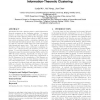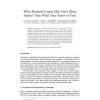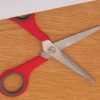284 search results - page 44 / 57 » Learning the parts of objects by auto-association |
KDD
2008
ACM
14 years 8 months ago
2008
ACM
Information-theoretic clustering aims to exploit information theoretic measures as the clustering criteria. A common practice on this topic is so-called INFO-K-means, which perfor...
IJCNN
2007
IEEE
14 years 1 months ago
2007
IEEE
Learning by human tutelage means that a human being guides the attention of a robot or agent in order to teach it a given concept. This kind of learning is very important to devel...
KDD
2012
ACM
11 years 10 months ago
2012
ACM
Multi-label learning arises in many real-world tasks where an object is naturally associated with multiple concepts. It is well-accepted that, in order to achieve a good performan...
AIED
2009
Springer
14 years 2 months ago
2009
Springer
Researchers of educational technologies are often asked to do the impossible: make students learn and have them enjoy it. These two objectives, though not mutually exclusive, are f...
ICIP
2006
IEEE
14 years 9 months ago
2006
IEEE
We present a probabilistic approach to shape matching which is invariant to rotation, translation and scaling. Shapes are represented by unlabeled point sets, so discontinuous bou...




